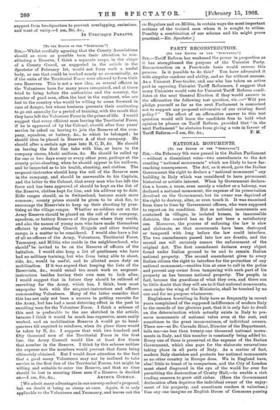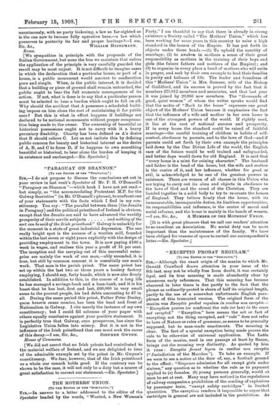NATIONAL MONUMENTS.
LTO THE EDITOR Or THI " SMUT...TOR:1
SIE,—On February 8th were passed in the Italian Parliament —without a dissentient voice—two amendments to the Act creating "national monuments" which are likely to have far- reaching consequences. The Act, as it stood, gave the Italian Government the right to declare a "national monument" any building in Italy which was considered to have permanent historical or artistic interest. When by Government declara- tion a house, a room, even merely a window or a balcony, was declared a national monument, the expense of its preservation devolved on the Government, but its owner was deprived of the right to destroy, alter, or even touch it. It was examined from time to time by Government officers, who were supposed to report on its condition. But as national monuments are contained in villages, in isolated houses, in inaccessible districts, the control has so far not been a satisfactory one. Moreover, the process of enforcing the law is slow and elaborate, so that monuments have been destroyed or tampered with long before the law could interfere. The two amendments passed into law are drastic, and the second one will certainly ensure the enforcement of the original Act. The first amendment declares every object found under Italian ground to be and to remain Italian national property. The second amendment gives to every Italian citizen the right to interfere for the protection of any national monument,—enables him at once to call in the police and prevent any owner from tampering with such part of his property as has become national property. The people, in fact, become the guardians of what they own, and there can be little doubt that they will see to it that national monuments, once under the wing of the Ministerio, shall be touched by no one and for no purpose whatsoever.
Englishmen travelling in Italy have so frequently in recent years complained of the supposed indifference of modern Italy to the records of her glorious past, that it is only fair to dwell on the determination which actually exists in Italy to pre- serve monuments of national value even at the cost, and sometimes to the great inconvenience, of individual owners. There are—so Dr. Corrado Ricci, Director of the Department, tells me—no less than twenty-one thousand national monu- ments in Italy, and this number is constantly being added to. Every one of these is preserved at the expense of the Italian Government, which also pays for the elaborate excavations taking place in all parts of Italy. As a matter of fact, modern Italy cherishes and protects her national monuments as no other country in Europe does. We in England have, alas! little to boast of in comparison, and the City of London must stand disgraced in the eye of the world for ever for permitting the destruction of Crosby Hall,—to enable a rich trading concern to grow still richer. (Here the Government declaration often deprives the individual owner of the enjoy- ment of his property, and sometimes renders it valueless.) Can any one imagine an English House of Commons passing
unanimously, with no party bickering, a law so far-sighted as is the one now to become fully operative here,—a law which preserves to posterity its fair and proper heritage P—I am,
[We sympathise in principle with the proposals of the Italian Government, but none the less we maintain that unless the application of the principle is very carefully guarded the result may be most unjust. It is not difficult to imagine cases in which the declaration that a particular house, or part of a house, is a public monument would amount to confiscation pure and simple. When, in the public interest, it is decided that a building or piece of ground shall remain untouched, the public ought to bear the full economic consequences of its action. If not, what is done is to say that a particular person must be selected to bear a burden which ought to fall on all. Why should the accident that A possesses a scheduled build- ing impose on him alone the cost of maintaining it for public uses P But this is what in effect happens if buildings are declared to be national monuments without proper compensa- tion being made to the owner. The ownership of beautiful or historical possessions ought not to carry with it a heavy pecuniary disability. Charity has been defined as A's desire that B should relieve C. Let us not imitate this by defining public concern for beauty and historical interest as the desire of A, B, and C to force D, if he happens to own something beautiful or historical, to bear alone the burden of keeping it in existence and unchanged.—En. Spectator.]





































 Previous page
Previous page